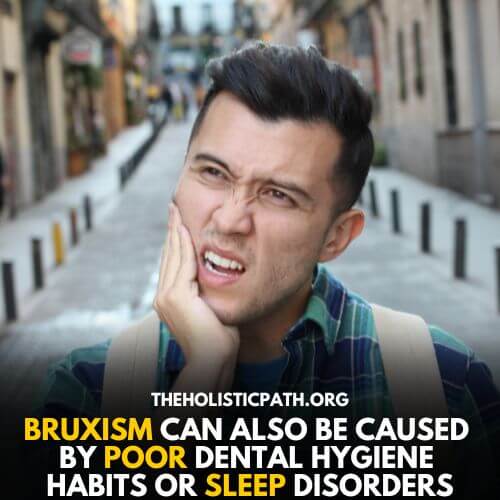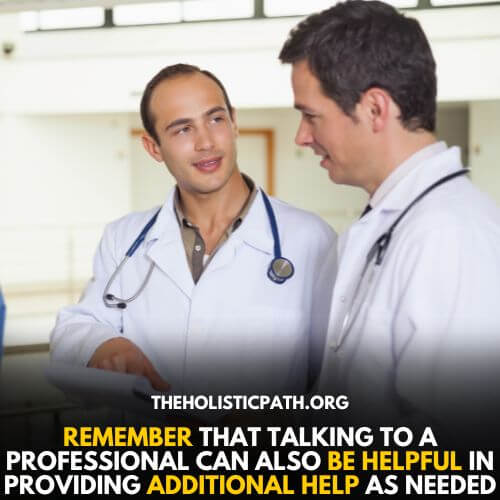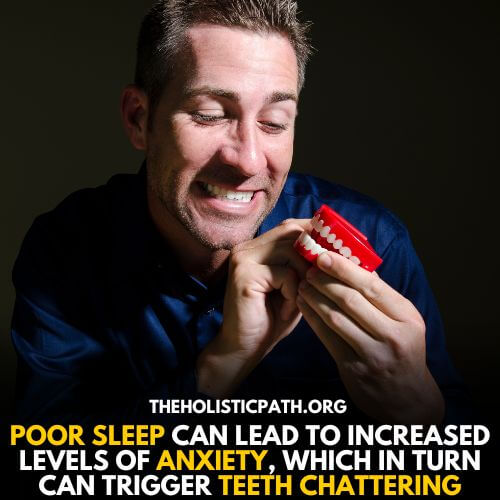Have you ever found yourself in a situation that made your teeth start to chatter and you weren’t cold? It is possible that this involuntary reaction is actually a physical sign of anxiety. It is widely known that our bodies react in different ways when we are feeling anxious, but is teeth chattering a sign of anxiety?
This article will dive into this reaction, discussing its physical implications and the science behind it. Exploring the context and meaning of “is teeth chattering a sign of anxiety” can provide understanding for those who experience anxiety on a regular basis.
Teeth Chattering And Grinding
Teeth chattering and grinding, also known as bruxism, is a common condition that affects many people. It’s the involuntary clenching and grinding of teeth during the day or while you’re sleeping. It can cause pain in your jaw muscles, headaches, and even damage your tooth enamel if it goes on for too long.
During sleep bruxism, people may experience episodes of teeth grinding and clenching that last up to 10 seconds at a time. Another form of bruxism is awake bruxism, which can be caused by stress or anxiety. People who have awake bruxism may clench their teeth without even being aware they are doing so.
Is Teeth Chattering A Sign Of Anxiety
Yes, teeth chattering can be a sign of anxiety. Studies have shown that people who suffer from anxiety tend to clench their jaws and grind their teeth more than those without anxiety. Additionally, research has shown that when people are feeling stressed or anxious, they may subconsciously start to clench and grind their teeth in an effort to cope with their emotions.
When it comes to why teeth chattering is linked to anxiety, scientists believe it may be due to the body’s natural fight-or-flight response. When we are faced with a stressful situation, our bodies prepare to respond by releasing stress hormones such as cortisol.
This response can trigger the body’s muscles, including those in the jaw, to tense up and clench. Additionally, some research suggests that teeth chattering is an unconscious act of self-soothing or a way for people to distract themselves from their anxiety.
The physical act of clenching the jaw tightens the muscles in the face, which can trigger sensations like tingling or numbness in the head and neck or even cause headaches. Additionally, this involuntary reaction is seen to increase heart rate as well as cortisol levels (the stress hormone). These changes in physiology can make a person feel more anxious or panicked.
It’s important to note that bruxism is not exclusive to anxiety.

Bruxism can also be caused by poor dental hygiene habits or sleep disorders. It can also be caused by physical issues such as temporomandibular joint (TMJ) disorder, sleep apnea, or a medical condition like Parkinson’s disease. Therefore, it is important to talk to your doctor if you are feeling anxious or experiencing teeth chattering in order to determine the cause and get the necessary treatment.
10 Symptom Of Teeth Chattering
People who experience teeth chattering as a physical symptom of anxiety may feel confused and overwhelmed. It’s important to understand what this involuntary reaction means so you can better manage your stress levels. Here are some signs that indicate teeth chattering is a sign of anxiety:
- Uncontrollable clenching and grinding of the jaw muscles.
- Pain or tenderness in the jaw area after episodes of teeth grinding.
- Headaches, particularly in the temples.
- Teeth sensitivity to hot or cold foods and drinks.
- Worn down tooth enamel from grinding.
- Earache related to bruxism or TMJ (temporomandibular joint disorder).
- Neck and shoulder pain.
- Teeth lock together when trying to open or close the jaw.
- Difficulty sleeping due to teeth grinding and clenching throughout the night.
- A feeling of tightness in the jaw area after episodes of teeth grinding.
Bruxism And Teeth Chattering
Aside from anxiety, Bruxism can also be caused by physical issues such as temporomandibular joint (TMJ) disorder, sleep apnea, or a medical condition like Parkinson’s disease. These types of bruxism can cause teeth chattering in the same way as anxious bruxism. When an individual clenches and grinds his/her teeth, it causes increased tension in the jaw muscles which then translates into involuntary teeth chattering.
Bruxism is a condition in which people grind or clench their teeth unintentionally, either during the day (awake bruxism) or while they sleep (sleep bruxism). It can occur due to many different factors such as stress, anxiety, misaligned teeth, and clenching of teeth due to medical conditions like Parkinson’s disease and TMJ disorder.
Teeth chattering is usually associated with awake bruxism. People who suffer from this form of bruxism tend to unconsciously clench and grind their teeth over long periods of time when stressed or anxious.
Sleep bruxism can also cause teeth chattering.
During sleep, episodes of grinding and clenching can last up to 10 seconds at a time, often occurring several times a night. The intensity of the clenching can range from mild to severe, depending on the individual’s level of sleep disturbances. People who suffer from sleep bruxism tend to experience increased levels of stress, anxiety, and fatigue during waking hours due to a lack of restful sleep.
Why Do My Teeth Chatter During Anxiety? 8 Possible Causes
Anxiety-related teeth chattering is a physical reaction to stress that can be caused by a variety of different factors. It is important to identify the cause in order to manage your anxiety levels better. Below are 8 potential causes of anxiety-related teeth chattering:
1. Stressful Events or Situations:
Stressful events or situations such as deadlines, exams, job interviews, public speaking engagements, and other high-pressure scenarios can trigger anxiety-related teeth-chattering. Stressful life events like the death of a loved one or other traumatic incidents can also cause this involuntary reaction. Here is what may be happening:
- Intense fear or apprehension ahead of an important event.
- Difficulty in focusing on the task at hand due to worrying about the outcome.
- Overwhelmed due to feeling unprepared for the task.
- Feeling like you need to ‘perform’ in order to succeed.
- Pressure from authority figures or expectations from others.
2. Low Self-Esteem
Low self-esteem can cause people to doubt their capabilities, leading to feelings of anxiety and low confidence which in turn can cause teeth chattering. Some of the things that contribute may include:
- Fear of failure or making mistakes due to a lack of self-confidence.
- Worrying about being judged or ridiculed by others.
- Feeling overwhelmed due to having too many tasks/goals.
- Negative thoughts about oneself and one’s abilities.
- Constant comparison with others leads to a lowering of self-esteem.
- Overthinking the consequences of taking action or not taking action.
3. Genetics:
Genetic factors can play a role in anxiety-related teeth chattering. People with a family history of bruxism may be more susceptible to this physical reaction due to inherited genetic traits. Here is how genetics can contribute:
- Abnormalities in brain chemistry increase the chances of developing tooth-clenching or grinding habits.
- A reduced ability to regulate stress hormones increases the risk of anxiety-related teeth chattering.
- Sleep disturbances due to genetic disposition may lead to increased anxiety levels during waking hours which can trigger teeth chattering.
- Genetics may influence the sensitivity of an individual to stress and anxiety.
- Genetic predisposition to certain cognitive states can increase one’s risk of anxiety-related teeth chattering.
4. Trauma:
Traumatic experiences in the past can lead to anxiety-related teeth chattering. People who have experienced physical, sexual, or emotional abuse may experience feelings of fear and apprehension which can result in this involuntary reaction. Trauma plays a role in teeth chattering because:
- Memories from traumatic events trigger an increase in stress hormones.
- Fear of reliving the trauma due to reminders that evoke strong emotions.
- Difficulty in trusting other people or institutions leads to heightened levels of anxiety.
- Cognitive distortions such as generalizing a negative experience into all aspects of life.
5. Poor Sleep:
Poor sleep can lead to increased levels of anxiety, which in turn can trigger teeth chattering. People who have difficulty falling asleep or staying asleep may be more prone to this physical reaction due to a lack of restful sleep. Here is what may be happening:
- Difficulty in relaxing and winding down before bedtime due to worrying thoughts.
- Overstimulation from exposure to electronics late at night causes hyperarousal that disrupts the body’s circadian rhythm.
- Anxiety-related nightmares that cause disruption in sleeping patterns.
- An uncomfortable sleeping environment contributes to poor sleep quality.
6. Medication Side Effects:
Certain medications may have side effects that include teeth chattering. People who are taking antidepressants, antipsychotics, or other psychotropic drugs may experience this physical reaction due to their medication. Here is what may be happening:
- Overstimulation of certain neurotransmitters is caused by the drug’s chemical composition.
- Increase in stress hormones due to changes in body chemistry.
- Irritability and restlessness caused by certain drugs can lead to teeth chattering.
- Interactions between different types of medications can worsen the side effects.
7. Hormonal Changes:
Hormonal fluctuations can also be a cause of anxiety-related teeth chattering. People who are going through puberty or menopause may experience changes in their hormone levels which can lead to this physical reaction. Here is what may be happening:
- Unstable hormones create an imbalance in the body’s chemistry.
- Increased sensitivity to stress and anxiety due to hormonal shifts.
- Low energy and fatigue caused by hormonal imbalances which can add to feelings of anxiousness
- Impaired cognitive functioning due to hormonal disruptions leads to increased worry and fear.
8. Neurological Disorders:
Certain neurological disorders can also cause teeth chattering. People with conditions such as epilepsy or Tourette’s Syndrome may be more prone to this physical reaction due to underlying neurological dysfunctions. Here is what may be happening:
- Seizure activity that disrupts normal brain functioning.
- Compulsions and tics associated with certain neurological disorders may lead to teeth chattering.
- Abnormal brain activity causes involuntary movements which result in teeth clenching or grinding.
- Cognitive impairments linked to specific neurological conditions lead to heightened anxiety.
How Do I Stop My Teeth Chattering From Anxiety? 12 Useful Tips
Teeth chattering is a physical reaction to stress and anxiety that can be both embarrassing and uncomfortable. While it may seem as though there is little one can do to control this involuntary action, there are practical tips and strategies that can help reduce the frequency of teeth chattering. Here are 12 useful tips for dealing with teeth chattering:
- Practice Relaxation Techniques: Learning to relax your body and mind can help reduce anxiety levels which can in turn make it easier to control the physical reaction of teeth chattering. Try deep breathing, progressive muscle relaxation, or meditation for a few minutes each day.
- Exercise Regularly: Exercise has been shown to reduce stress hormones and increase endorphins which can help with controlling anxious thoughts. Aim for 30 minutes of moderate activity such as walking, swimming, or biking on most days of the week.
- Get Adequate Sleep: Poor sleep is linked to increased levels of anxiety which may worsen teeth-chattering symptoms. Try to create a consistent sleeping schedule and establish good sleep habits by limiting caffeine and electronics late at night.
- Talk to a Professional: If you are struggling to manage anxiety and teeth chattering on your own, it may be beneficial to talk to a therapist or mental health professional. They can provide personalized strategies tailored to your individual needs.
- Limit Caffeine Intake: Too much caffeine can increase stress hormones in the body which can lead to increased anxiety levels and worsen teeth-chattering symptoms. Make sure to limit caffeine intake or switch over to decaf versions of drinks as needed.
- Avoid Triggers: Identifying situations that trigger feelings of anxiousness can help reduce the physical reaction of teeth chattering before it occurs. Try avoiding people, places, and things that make you feel uncomfortable or overwhelmed whenever possible.
- Practice Mindful Eating: Eating mindfully can help reduce anxiety and stress levels that may trigger teeth-chattering symptoms. Eat slowly, savor each bite, and avoid big meals late at night which can worsen anxiety-related symptoms.
- Reach Out For Support: Connecting with friends, family or support groups can be beneficial in managing anxious thoughts and reducing stressful situations. Having someone to talk to can make it easier to cope with difficult emotions associated with teeth chattering.
- Take Time To Unwind: Allowing yourself time to relax and unwind can help reduce anxiety levels that may lead to teeth-chattering episodes. Try reading a book, listening to music, or taking a warm bath before bedtime for an extra calming effect.
- Exercise Self-care: Taking care of yourself is essential for managing stress, anxiety, and any related physical reactions such as teeth chattering. Schedule regular self-care activities, get enough sleep, and treat yourself with kindness on a daily basis to promote overall wellbeing
- Try Herbal Remedies: Herbal remedies such as passionflower or valerian root can help reduce anxiety levels naturally when taken in moderate amounts. Speak with your healthcare provider before taking any supplements to make sure it’s right for you.
- Seek Medical Attention: If the symptoms of teeth chattering become bothersome or interfere with daily life, then seeking medical attention may be necessary. Your doctor can evaluate the cause of the condition and provide treatment options to reduce or eliminate the symptoms.
These tips can help provide relief from teeth chattering and allow you to manage any underlying anxiety conditions effectively. It is important to remember that everyone’s experience with anxiety is different so it may take some trial and error before finding a treatment plan that works for you.
With patience, practice, and support, managing teeth chattering can be achieved in time.
If you are having difficulty dealing with teeth chattering or anxious thoughts, then speak with your healthcare provider right away. They can help assess any underlying causes and provide the necessary resources to help improve overall well-being. Remember, you do not have to go through this alone! Seek out professional help as needed.
10 Practical Tips For Managing Anxiety To Stop Anxious Teeth Chattering
Living with anxiety can be difficult, especially when it affects your physical health. Teeth chattering is a common physical symptom of anxiety that can cause feelings of discomfort and embarrassment.
Fortunately, there are some simple strategies you can use to manage this condition and reduce its symptoms. Here are 10 tips for managing anxiety to stop anxious teeth chattering:
- Practice Relaxation Techniques: Taking time out of the day to practice relaxation techniques such as deep breathing, progressive muscle relaxation or guided imagery can help reduce stress levels and soothe anxious thoughts.
- Exercise Regularly: Exercising for at least 30 minutes per day has been shown to help reduce stress hormones in the body which may contribute to teeth-chattering symptoms.
- Talk To A Professional: Seeing a therapist, counselor or psychologist can help provide guidance to reduce anxious thoughts and manage stressors in life.
- Stick To A Routine: Having a regular routine with consistent bedtimes and wake times can help make it easier to relax in the evening which may help reduce teeth-chattering episodes.
- Avoid Stressful Situations: Taking steps to avoid stressful situations such as crowded places or busy stores can be beneficial for keeping anxiety levels at bay and preventing feelings.
- Get Enough Sleep: Adequate sleep is essential for managing stress and any related physical reactions such as teeth chattering. Aim to get at least 8 hours of restful sleep each night.
- Create A Bedtime Routine: Establishing a calming bedtime routine can help promote better sleep quality by reducing stress and anxiety levels. This may include activities such as taking a warm shower, stretching, or reading before going to bed as well as limiting caffeine and electronics late at night.
- Take Breaks During The Day: Taking a break during the day to focus on your breathing and recenter yourself can help reduce stress levels and any related physical reactions such as teeth chattering.
- Limit Caffeine Intake: Too much caffeine can overstimulate the body and nervous system which can contribute to teeth-chattering episodes. Try limiting your intake of caffeinated beverages such as coffee or soda throughout the day.
- Seek Professional Help: If you are struggling with anxiety or teeth-chattering symptoms, don’t hesitate to reach out and seek help from a professional. A therapist, counselor, or doctor may be able to provide personalized guidance and support to help manage anxious thoughts and reduce related physical reactions.

By following these tips, you can start taking steps towards managing anxiety and reducing its physical symptoms such as teeth chattering. Remember that talking to a professional can also be helpful in providing additional help as needed.
Takeaway
Teeth chattering can transcend mere shivers, potentially revealing a deeper emotional landscape. Research suggests that it might serve as a subtle indicator of underlying anxiety. So, the next time you find yourself involuntarily chattering, it might be worth considering the state of your mental well-being.
References
Sutin, A. R., Terracciano, A., Ferrucci, L., & Costa, P. T. (2010). Teeth grinding: Is Emotional Stability related to bruxism? Journal of Research in Personality, 44(3), 402–405. https://doi.org/10.1016/j.jrp.2010.03.006
Chemelo, V. D. S., De Sousa Né, Y. G., Frazão, D. R., De Souza-Rodrigues, R. D., Fagundes, N. C. F., Magno, M. B., Da Silva, C. L., Maia, L. C., & Lima, R. R. (2020). Is There Association Between Stress and Bruxism? A Systematic Review and Meta-Analysis. Frontiers in Neurology, 11. https://doi.org/10.3389/fneur.2020.590779

